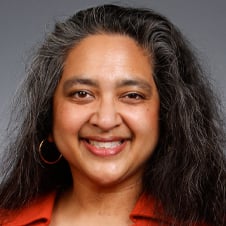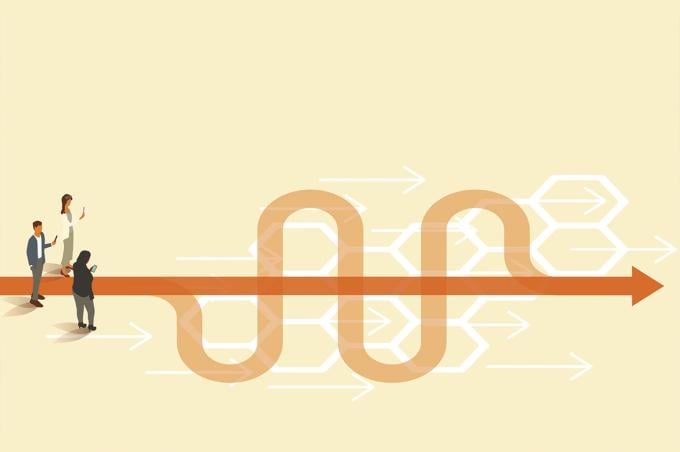When Stella Dantas, MD, and her husband traveled to the Taiwan Association of Obstetrics and Gynecology conference, many attendees eagerly greeted her husband.
“People were coming up and shaking his hand, likely because they thought he was the president. But then I got up to the stage to give my presidential address and surprised people,” said Dr. Dantas, president of the American College of Obstetrics and Gynecology (ACOG) and ob-gyn at Northwest Permanente in Hillsboro, Oregon.
Northwest Permanente is a member of the AMA Health System Program, which provides enterprise solutions to equip leadership, physicians and care teams with resources to help drive the future of medicine.
“Afterward, a number of young physicians came up to talk to me because they had never seen someone who looked like me in a position like that—and a light bulb just went on for them,” she said.
This is just one reason Dr. Dantas takes her role as a woman leader in medicine so seriously.
“It’s really important for us to have people that we see in ourselves in different positions of leadership,” Dr. Dantas said. “It inspires people, and they feel like they can do it too.”
As the president of ACOG and a physician leader at Northwest Permanente, Dr. Dantas describes herself as a “servant leader” on a mission to support and serve her peers.
On a recent episode of “PermanenteDocs Chat,” Dr. Dantas offered up valuable insights to help other leaders navigate the often rocky health care landscape and how to guide their teams with strong, steady and compassionate leadership.
Building community and culture
In her role as ACOG president, Dr. Dantas is helping to tackle some of the biggest challenges facing physicians today. This includes legislative interference in health care, payment issues, administrative burdens, medical misinformation and physician burnout.
“My focus is about community, connection and belonging,” she said. “I can't solve reimbursement issues, legislative interference or administrative burdens tomorrow—we are always working on those things.
“But what I can do is provide the community, culture and team to help us stick together and get through it,” Dr. Dantas added.
In fact, she started building and nurturing this community at her very first ACOG board meeting. To ensure that everyone had a voice, Dr. Dantas intentionally created a space for people to ask questions, push back and be heard.
“I started my first board meeting saying that I need to hear from everybody in the room,” she explained. “I told them if I ever do something where you feel like I’m cutting you off or I haven’t [heard you], I want you to let me know [because] it’s going to take all of us in the room to accomplish the work ahead.”
Her goal is to create connections by giving people a place where they feel like they belong and where their voice is heard and trusted—even if some people are reluctant.
“When I’m leading a meeting and I see people who are quiet, I’m going to create space for them and ask them their thoughts,” Dr. Dantas said.
Giving people an opportunity to engage establishes a culture of collaboration where everyone has a stake in the agenda and initiatives. Of course, that doesn’t mean everyone has to agree all the time. Instead, it fosters respectful debate, compromise, collaboration and clear communication.
“Sometimes we’re not all on the same page, but if you can understand the why and effectively communicate the why, we can all wrap our minds around the same thing and still be rowing in the same direction,” said Dr. Dantas.
It starts with leadership
As a leader, Dr. Dantas is committed to creating psychological safety. This serves as the foundation on which to build a strong culture. Naturally, establishing that psychological safety starts at the top with strong, diverse leadership.
To do this, Dr. Dantas suggests that effective leaders often have to be all things to all people. That means it’s a constant balancing act—they need to be driven yet flexible, analytical yet open-minded, tough yet amiable.
“It's also about listening, being vulnerable and relating to people,” said Dr. Dantas. “You have to be able to build relationships and build connections to have the hard conversations. That is all critical to creating psychological safety.”
Once that foundation is set, leaders can build a team to drive toward their vision—always being mindful of their own blind spots along the way.
“As a leader, you don't have to know everything,” said Dr. Dantas. “You just have to get the right people around you.”
To ensure that you’re bringing together the right team, it’s crucial to invest in taking the time to get to know everyone on your team—their strengths, weaknesses and potential.
“It’s about understanding where people's real talents are, and then giving them something to do that lets them use those skills,” Dr. Dantas said. “You have to recognize what their gifts are. And then let them have autonomy … by getting out of their way and letting them work to their skillset.”
Address administrative burden
Community building that is centered on diverse skillsets and personalities is one approach to addressing one of the biggest challenges physicians are facing today: administrative burdens.
“People go into medicine to take care of patients, and then all the administrative work gets piled on,” said Dr. Dantas. “And there’s no time to do it because we’re always going to tend to the patients first because that’s our calling.”
Through her role with ACOG, Dr. Dantas is bringing her community-building expertise to the table to figure out the right collaborative teams, support and operational systems needed to alleviate some of this burden for physicians. And she’s tapping into her experience at Northwest Permanente as a model.
“At Permanente, we work in multidisciplinary teams where everyone is working top-of-scope together to take care of the population,” she said. “So, it’s about doing that work” for physicians too.
“It’s really about servant leadership,” Dr. Dantas said. “It’s about how can I help my colleagues? How can I help my patients? How can I be of service? As opposed to it being all about you as the physician. We’re an enormous team.”
As the leader in physician well-being, the AMA is reducing physician burnout by removing administrative burdens and providing real-world solutions to help doctors rediscover the Joy in Medicine™.
Foster a sense of belonging
Dr. Dantas notes that once your team is in place, they need to know you have their back—just as they have yours.
Your team needs to trust that not only will their leader take care of them, but that the overall health system or organization will too. That relationship is crucial for addressing physician burnout and retention in health care.
“Our physicians are burning out and we have to take care of them,” Dr. Dantas said.
One of the first steps to addressing burnout and retention is creating a sense of belonging. If people feel like their organization is there for them, they will show up for their organization.
“If an organization understands all the pieces to support well-being and actually puts energy toward that, it creates an affinity,” Dr. Dantas said. “Then, even with hard stuff, people want to stay and keep working with each other.”





